A couple has lost their claims dispute after failing to remember their previous claims history when purchasing an Auto & General motor policy.
The Australian Financial Complaints Authority (AFCA) has ruled that the oversight was a breach of the disclosure obligations and the insurer was entitled to decline the latest claim for damage to the couple’s vehicle.
When purchasing their policy, the couple was asked how many claims they had made in the last five years. They indicated they were unsure whether it was one or two, and the insurer’s representative suggested that they disclose two claims.
The couple should have disclosed four claims. If they had disclosed the full extent of their claims history, the insurer’s underwriting criteria would have ruled them out.
“The complainants say they forgot about one of the non-recoverable claims,” the AFCA’s ombudsman said.
“While this may have been the case, it does not change the outcome.”
“It is reasonable to expect a person to know their claims history. I do not accept forgetting means the claims history was not known to the complainants for the purpose of section 21A(5)(i) of the [Insurance Contracts] Act.”
The AFCA said that an innocent non-disclosure is still a non-disclosure, and therefore a breach of the complainant’s duty.
“I am satisfied that, by failing to disclose two of the four claims the complainants had in the five years prior to policy inception, the complainants failed to comply with their duty of disclosure.”
“I am satisfied if the complainants disclosed their full claims history, the insurer would not have agreed to offer the policy and would not have insured the complainants.”
“Therefore, under section 28 of the Act, the insurer is entitled to reduce its liability to nil and refuse to pay the claim.”
You can read the full ruling here.
Interested in a dedicated broker for your home or business? Contact us for your own specialised quote.
Credit:


